Productivity
Everybody needs a break once in a while

Everybody needs to take a break once in a while.
When we’re stressed and overwhelmed with work it can be challenging to take a few hours or a few days for ourselves. But spending a little time somewhere quiet, with a nice view, is a great way to slow down and regain perspective. In the grand scheme of things, having too many difficult projects with too-short deadlines is temporary. Life is bigger than our jobs.
When work and life are flowing smoothly, it is still important to take a break every now and then. Instead of using the time to recover, we can just…be. Breathe fresh air, watch a sunset, spend a few hours looking at geese making their way up and down a shoreline. It might spark creativity. It might just be a chance to shore up energy reserves that we’ll need to draw on later.
Do you need a break?
5 Second Rule

The other day I was eating cake at my desk when I accidentally knocked the pan off the table. It landed frosting-side down on the carpet.
My first reaction was to panic in case the frosting had become smooshed into the carpet strands (it hadn’t). Then I laughed, calmly picked up crumb after crumb with my fingertips and got back to work.
I was glad I didn’t get frustrated about the mess and the time it took to clean up. I think my relief at not having to deep-clean a quarter inch of chocolate goop out of carpet fiber helped me relax and find the humor in it. But I also remember a flicker of a moment when I decided to think it was funny instead of a setback to my schedule.
Maybe the next time I have a setback with work, I’ll use that blink of time to lighten up, or steel myself, or to decide to shrug and let it go. Kind of like I did with the cake crumbs.
The Importance of Work Habits
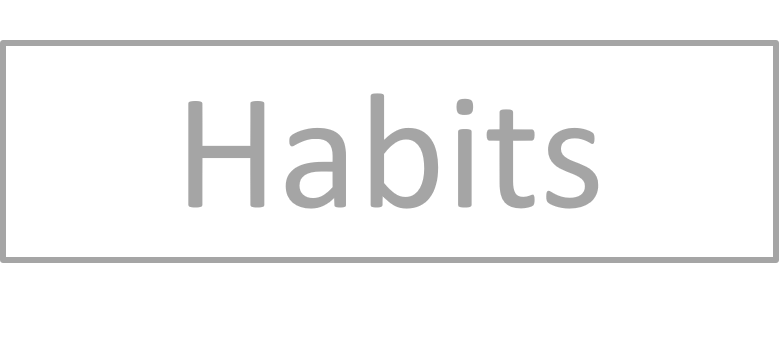 I subscribe to James Clear’s emails, which are full of productivity tips. The latest article that I read described the scientific reason why our lives become chaotic without continuous effort to maintain order.
I subscribe to James Clear’s emails, which are full of productivity tips. The latest article that I read described the scientific reason why our lives become chaotic without continuous effort to maintain order.
I was already well aware of this phenomenon as it relates to managing a household. Think of how quickly laundry piles up, stacks of unopened mail spread across countertops, and dust becomes visible on the dining room table. If I don’t stay on top of these chores, the house looks completely cluttered.
Housework never ends.
Reading James Clear’s article made me think about how our jobs can become overwhelming and disordered if we don’t pay attention to regular tasks that provide structure and organization.
Email never ends, either.
I’m most effective at work when I stick to established habits. For example, as soon as I’ve sent or responded to an email, I either delete it or file it in my Outlook folder system. It prevents my mailbox from being clogged with messages I don’t need and lets me quickly locate the ones that I need to refer to later.
I have similar routines for managing paperwork and accounting tasks, but the habit that made the biggest difference in my work was making a point to write every day. Whether it was just a sentence or two, or revising paragraphs I’d already written, the daily effort kept my writing projects moving forward and trained my brain to get into “writing mode” more quickly. Even creative tasks benefit from habits that provide structure and predictability.
The more established our habits are, the easier it is to stay in control of our work.
When Bad Ideas Happen to Good Employees
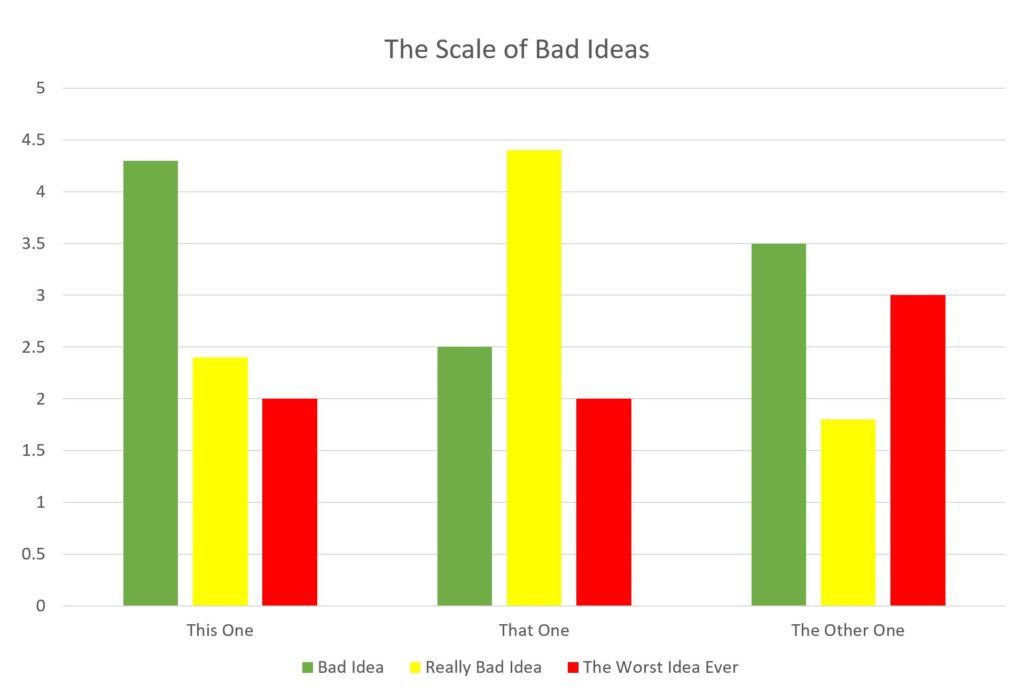 Recently a friend told me a funny story about one of his coworkers. His company hired someone to help them cut costs and reduce wasted time and materials. Essentially, his job was to make the company run more efficiently to increase profitability.
Recently a friend told me a funny story about one of his coworkers. His company hired someone to help them cut costs and reduce wasted time and materials. Essentially, his job was to make the company run more efficiently to increase profitability.
I was immediately interested in this story because I’m a big fan of efficiency. Or maybe just a big hater of wasted time and money. Either way, I know a bit about Lean Manufacturing Principles and Rapid Improvement Processes and was curious to know what techniques this person was using.
One of the processes he implemented required everyone who worked in their office to keep three colored cups at their workspaces. If everything was fine, they were supposed to display a green cup on the corner of their desk. If they had a non-urgent issue, they used a yellow cup, and the red cup was for when they needed their manager immediately.
By this point in the story I was already laughing, imagining a room full of adults being told they needed to use plastic drinkware to signal how well they were managing their work throughout the day.
I have no idea why the efficiency expert thought this was a good idea, or why he tried to implement it without getting buy-in from the staff first. If he had asked for feedback, he would have realized that nobody wanted to announce to their entire office when they had an issue they couldn’t resolve on their own. Plus, when people had questions, they just asked them, so it was solving a problem that didn’t exist.
But he didn’t get their feedback first, so everyone had to suffer through an office full of people sabotaging a process while feeling foolish and irritated.
Leading a team through a Rapid Improvement Process can have the complete opposite result. The surface-level benefit is that a work process that was slow, wasteful, or otherwise unpleasant is transformed for the better. But the real win is the positive impact in morale. When people are asked how their tasks could function more smoothly and work together as a team to create solutions, they feel valued, they are given some control over their work environment, and they bond during the process.
Dream Big, They Said
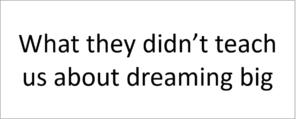 Remember when we were little kids and we were told we could do anything we set our minds to? We heard it mostly in grade school, but also in after-school programs and from parents.
Remember when we were little kids and we were told we could do anything we set our minds to? We heard it mostly in grade school, but also in after-school programs and from parents.
We were told inspiring accounts of people who achieved great things. We learned of career options from astronaut to president and told we could have those jobs. We were taught about Mother Theresa and Martin Luther King Jr and told we too could do big work with a big impact that helped many people.
We were told to dream and work hard. We could do great things in our lives. We just had to make up our minds and go for it.
Teachers and the others – they can’t very well NOT say those things. Where would we be if we hadn’t been told to have dreams and try to reach them?
I wish, though, that we had been taught what to do when things go wrong in our pursuit of our big dreams. And what to do when life squishes our dreams before we even really attempt to achieve them.
I think it happens as early as high school – when we trade in our grand ideas for more practical matters. Our awareness grows. We understand what we hear on the news and its implications in our own lives…jobs and joblessness, natural disasters, war…
There are also timelines to consider. Preparing for the first job out of high school, or attempting to get into college and then deciding what to study. And then graduating and needing a job and a place to live.
After college I wasn’t dreaming much. I enjoyed my life and dove into the beginning of my career, but looking back, I can say my dreams were replaced by goals.
And my goals – at least the biggest two that I accomplished in my adult life so far – didn’t even come from a strong desire within myself to achieve something meaningful.
Instead, they were inspired by obstinacy.
It is true that since college, if not earlier, I vaguely expected to get an advanced degree at some point in my life. However, it wasn’t until I was rejected from a year-long marketing certificate program that I was motivated to get an MBA. My exact thinking was, “Seriously, I was turned down for a certificate? Screw them, I’m getting a master’s degree.” Some rigorous GMAT prep and five years of school later, I had my degree. Ultimately, I was glad I was refused participation in the certificate because it turned out to be a fraction of what I wanted to learn and was capable of achieving.
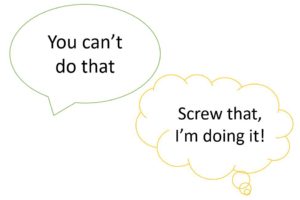 My second example is only slightly different, in that I hadn’t thought about home ownership as a goal at all. I was about to give up my apartment to move to another place with someone when circumstances changed and obstinacy kicked in again.
My second example is only slightly different, in that I hadn’t thought about home ownership as a goal at all. I was about to give up my apartment to move to another place with someone when circumstances changed and obstinacy kicked in again.
I decided I would make housing plans on my own and buy a place instead of renting. I made a budget in excel, put as much as I could into the down payment and fees, and then I owned a home.
I didn’t need to learn to use rejection and setbacks as motivation but I think it should be taught. I hear too many stories from older writers and artists who put down their pens when they were young adults because somebody told them they weren’t talented. It seems like it would be a very useful lesson plan to prepare kids for when they are told no, they can’t, they aren’t good enough, to muster a “screw you” attitude and pursue their art anyway.
Another skill that I wish I had been taught in school is how to channel disappointment into something useful. I get depressed by civic issues of inequity and discrimination and need more than the grade school equivalent of a lemonade stand that raises money for these causes. My stabs at educating myself, speaking up, and seeking out groups to participate in seem the right steps for now, but I was floundering for a long time.
The lemonade stand fundraiser is great to show little kids that they can take initiative and tangibly provide support for causes. But then the cups are put away, the money is donated, and life goes on. What’s missing is sustained effort, and follow-up to see what impact was made. An analysis to determine what about the effort was successful and what can be done to improve. Or how to translate lessons learned into the next effort.
Some of my good friends share this sense of civic-work malaise. We have a sense of being pushed to put our skills and experience to better use. Even people who are working in non-profits or who are on the board of multiple civic groups are unsettled and feel there is more they should be doing. There is a limit to how many action committees a person can reasonably join, so it seems failure to achieve the desired impact is the problem. We’re falling short of our big dreams to make a big impact.
Wouldn’t it be great if we were taught throughout school how to be patient and sustain efforts over a long period of time, even when we don’t see the results we want? I remember being taught about Abe Lincoln’s personal and professional setbacks before he became president. He had business debts that took years to pay off, was a self-taught lawyer, and lost his first attempt to win an Illinois state legislative position.
What isn’t clear is what motivated him to keep pursuing his dreams.
I wonder if he was driven by a belief that he had something to offer people. Maybe he resolved to keep trying, and to look for ways to use his abilities to be of service.
What we do know is that he said yes to opportunities. Clearly he didn’t let fear of failure prevent him from going into business, becoming an attorney, or running for public office. After each misstep, he came back with resilience. Whatever doubts he might have had about his abilities to perform in those professions didn’t stop him from showing up and doing his work.
I didn’t learn these things in school, although I wish I had.
I’ll keep using obstinacy as fuel when people tell me I can’t do something I want to do. I’ll try to be patient with setbacks and keep ahold of my belief that I have something to offer, even when I don’t see progress.
You too, ok? When someone tells you no, go ahead and prove them wrong.
And keep the faith. You’ve got something to offer.
If you are struggling with your toxic work environment – good
If you are struggling with your toxic work environment – good. 
I’m sorry that you’re in a negative work situation, but the fact that you’re struggling with it is positive.
If you are resistant when your management instructs you to take actions that are bad for customers or waste shareholder money – good. You care about doing the right thing.
If you are caught between the need to speak up about workplace bullying and the need to keep your paycheck and healthcare benefits – good. Your ethics are showing.
If the subtle, persistent discrimination against certain employees leaves you feeling drained – good. Your body itself is signaling that you are in a dangerous environment.
I am sorry that you are in a job that harms your wellbeing. However, I am glad that you are reacting negatively to a noxious job situation. Your struggle reflects your morality and your desire for fairness. You have integrity. You are in touch with human decency.
I am not worried about your humanity.
I am worried about the other people, the ones who succeed in toxic work environments.
Employees who heartily laugh along with their manager’s discriminatory jokes and respond positively when others are harassed are encouraging this behavior to persist.
Employees that willingly support management decisions that waste time and money are also guilty of wasting time and money.
Employees that unscrupulous managers rely on to support their unethical tactics are also behaving unethically.
People that thrive in toxic work environments perpetuate them. They care more about advancing their careers than they care about integrity.
So, if you are struggling to survive in a toxic work environment – good.
I hope that you advocate for change that improves the situation for you and your coworkers. If that is not possible, save yourself and change jobs before you sink into a pit of stress, depression or low self-esteem.
Most importantly: I hope you keep your integrity.
Blahg Blahg Blahg
 I didn’t publish a blog post last week. Work was great, but I was feeling the accumulated effect of other stresses in my life and when Thursday evening came around, I went to bed early instead of writing a post. I figured I would post something by Sunday at the latest, because I’ve done that before when I didn’t feel like I had the energy to meet my self-imposed Thursday deadline.
I didn’t publish a blog post last week. Work was great, but I was feeling the accumulated effect of other stresses in my life and when Thursday evening came around, I went to bed early instead of writing a post. I figured I would post something by Sunday at the latest, because I’ve done that before when I didn’t feel like I had the energy to meet my self-imposed Thursday deadline.
Then it was the weekend and I slept through a lot of it, spent some time planting and watering and pruning the shrubs and trees around my house to relax, and zoned out reading books. Then on Sunday night instead of writing a blog post I started laying out a poetry manuscript for a chapbook contest that is ending soon. I stayed up way too late, until 3AM, sorting through my poems and formatting them into a 6 x 9 inch word document. Didn’t finish the chapbook and didn’t even attempt a blog post.![]()
Monday I was exhausted, of course, and went to bed early again. And today I rushed from one meeting to the next and to appointments after work and got in bed at 8:30PM for another early night. I read through my emails on my smartphone to make sure I didn’t miss anything important before going to sleep, and read this:
“What I Do When I Feel Like Giving Up”, by James Clear. It starts off with “I’m struggling today. If you’ve ever struggled to be consistent with something you care about, maybe my struggle will resonate with you too.” And then he goes on to write about how he’s consistently posted on his blog twice a week since November 2012.
Dammit, James.
I was ready to push off the guilty, nagging feeling I had about not blogging and prioritize my rest. Until I read his damn post. The entire article was about how he didn’t feel like writing that day and how he motivated himself to do it anyway.
Dammit, James!
So now I’m out of bed, at my desk writing this post, which I could have written last Thursday or any day since then but didn’t, until James put it in my face that it is my choice and that there are methods of motivating ourselves even when we feel like giving up. Even when we are convinced our reasons for not writing (or whatever) are rationale, and even when we are this close to tuning out and distracting ourselves.
I’ve even blogged about this topic before and could have taken my own advice. But I didn’t. I let my habit slide and now I’m putting in the effort to get back on schedule. It is a choice, and I could stop blogging or only blog when I feel inspired. My truth is that I do care about writing consistently and sharing what I’ve learned about meaningful work.
So thanks, James. And dammit.
Because Tove Lo Made Eating Dinner in the Bathtub Acceptable
 When Tove Lo sings about eating dinner in the bathtub, I’m thinking “right on!” Now that is a great time-saving life hack. I also admire her determination to get over her broken relationship, but cannot recommend using the rest of her lyrics as advice.
When Tove Lo sings about eating dinner in the bathtub, I’m thinking “right on!” Now that is a great time-saving life hack. I also admire her determination to get over her broken relationship, but cannot recommend using the rest of her lyrics as advice.
I once thought doing a parody of Katy Perry’s “Last Friday Night” would be fun, but only got as far as standing on a bar room chair before I got yelled at by the bouncer. I didn’t even get to the dancing on the table tops part. It was good night, anyway. I played tambourine on stage with the band. Percussion instruments are my specialty.
Anyway, I mention that as another example of gleaning the wisdom wherever you can while having the sense to ignore the parts that are going to get you thrown out of a club or desperately picking up daddies on the playground. In case it isn’t clear, those parts are NOT good advice to emulate; they are the parts to ignore.
Anyway, back to eating dinner in the bathtub. As I mentioned in my recent blog post, I’m all for drinking coffee in the shower, or even making coffee while reclining in bed. Showering is not recommended for most solid foods, however, because obviously you’re risking your meal disintegrating in front of your eyes. A bath is more logical for solid foods, especially pizza or boxed chocolates because they are easy to grip and less likely to become blended with your bath oils. Tove Lo knows what she’s talking about here.
A commenter suggested upgrading the bedside coffee hack to include a mini-fridge in place of a traditional nightstand in order to make a complete breakfast. This shows real ingenuity, especially because it broadens the options for eating dinner in bed as well. If you’re having such a hard time waking up in the morning that you have to make breakfast in bed, you are also probably tired enough to go to bed at dinner time.
Taking the evening meal in bed has endless possibilities because you can prepare any food that you want in the kitchen first and then take it to bed on a plate or a wad of paper towels. If you have life hacked your way up to mini-fridge-nightstand status, even better. Skip the kitchen and make dinner in bed, too. That hour that you would have spent preparing, consuming and cleaning up after a meal translates into an extra hour in bed. Who’s not up for that?!
I’ve been a fan of eating dinner in bed for a long time. A full stomach makes one tired, so you’re on your way to falling asleep quickly. And on the other hand, if you take your laptop to bed in the evening, you might as well maximize your multitasking by answering emails or posting on Facebook while eating. Tip: taking breaks to clean your fingers with a wet wipe will prevent your keyboard from getting greasy.
 Years ago, someone said to me, “I wouldn’t kick you out of bed for eating crackers.” The compliment was totally lost on me – Southerners and their Southern charm! Because it is totally normal and expected to eat crackers in bed. Anything you can eat out of the container it came in is a natural bedtime food choice.
Years ago, someone said to me, “I wouldn’t kick you out of bed for eating crackers.” The compliment was totally lost on me – Southerners and their Southern charm! Because it is totally normal and expected to eat crackers in bed. Anything you can eat out of the container it came in is a natural bedtime food choice.
I regularly settle under the covers for the night with a pint of Ben and Jerry’s or a box of crackers. It’s not like I eat junk food all the time, unlike Tove Lo and her Twinkies. I often choose gluten-free crackers. Sometimes I’ll even eat raw carrots; as many as will fit into an improvised paper towel baggie.
So there you have it. Just as coffee in bed immediately upon waking is recommended to jump-start your day, so is ending it on a comforting note by snuggling under the covers with your dinner.
Well. I guess there’s one more thing. Remember that you can find wisdom in just about anything if you’re looking for it. Just be sure to separate out the helpful information from the bad advice.

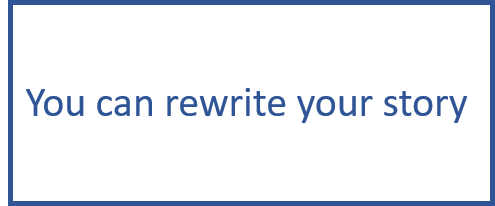
 Or the title that I prefer: My sock drawer is good for business.
Or the title that I prefer: My sock drawer is good for business.



Recent Comments